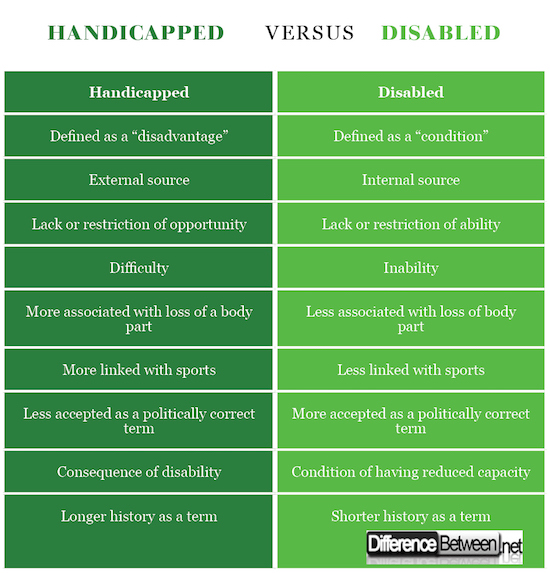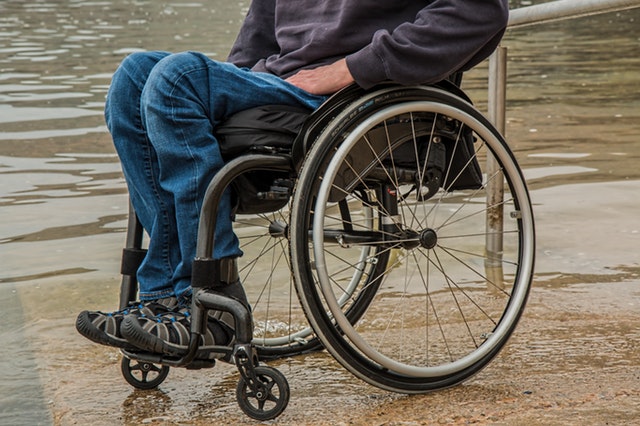The Difference Between Handicapped and Disabled
Handicap and disability are closely related terms which are often used concerning people with special needs. As they are very close synonyms, they are usually interchangeably used. In both situations, social stigma, low self-esteem, and support system issues may be experienced by the individuals.

What is Handicap?
The World Health Organization (WHO) defines a handicapped person to have a loss or limited opportunities in being involved in activities as compared to the majority of the population. A handicap is the effect of a disability. It focuses on an obstacle experienced by a person due to a restriction in the environment.
Origin of the Term Handicap
For many, handicap may seem as an odd word. In fact, it was only linked to the essence of physical disability in 1915 even if the word was already used centuries back. The following accounts are related to the origin of the term:
- The word “handicap” is said to have originated in 1504 when King Henry VII proclaimed that disabled veterans can legally beg. With their “cap in hand”, people with disabilities went to the streets; hence, “hand-in-cap”. However, several authors claim that this is a false origin of the term.
- Most sources claim that the origin is a lottery game called “hand-in-cap” which was played in the 1600s. Basically, the barter game involved putting forfeit money into a cap and the owner of the less valuable item has to pay up. The term then evolved to “hand i’cap” which became “handicap”.
- Overtime, “handicap” was linked to equity as it was commonly used in sports to make a certain competition fairer. For instance, faster horses were made to carry weights so they could be more on par with the slower ones.
- The term became widely understood as a way or condition to limit or impede.
- In 1915, “handicap” was first employed in connection with disability when it pertained to children with mobility impairments.
- In the 1950s, “handicap” was also applied to adults as well as those with intellectual disabilities.
- In the 1970’s, “handicapped” had been the legal term concerning social services.
What is Disability?
WHO defines a disabled individual to have any lack of ability in carrying out an activity in the means viewed as normal by the community. A disability is a reduced capacity to specifically perform a movement, detect certain sensory information, or execute a cognitive function. It is generally a lifelong condition such as blindness, intellectual disability, and cerebral palsy. For instance, a person who was born blind will likely experience restrictions in reading, navigating, and other related activities in his lifetime.
How “Disabled” Replaced the Term “Handicapped”
As the term “handicap” was associated with begging, a number of groups felt that it was not appropriate. In 1990, the American with Disabilities Act was passed and “handicapped” became passé. The activists who fought for the act chose the term “disability” as an acceptable euphemism.
Difference between Handicapped and Disabled
-
Definition of Handicapped and Disabled
According to Merriam-Webster, the definition of “handicap” is “a disadvantage that makes achievement usually difficult” while “disability” is defined as “a physical, mental, cognitive, or developmental condition that impairs, interferes with, or limits a person’s ability to engage in certain tasks…”
-
Internal/External of Handicapped and Disabled
Being handicapped denotes an external source as it is focused on the obstacle in education, communication, occupation, and other kinds of environment. On the other hand, being disabled is internal as it is centered on an individual’s reduced capacity to perform certain activities which is mainly attributed to illness, accidents, trauma, heredity, and other related conditions.
-
Ability of Handicapped and Disabled
As compared to being handicapped, being disabled is more centered on the lack or restriction of ability to accomplish an activity.
-
Lack of Opportunities for Handicapped and Disabled
As compared to being disabled, being handicapped is more focused on the loss or limitation of opportunities.
-
Challenges for Handicapped and Disabled
Generally, being disabled may face more challenges than being handicapped as the former concerns “inability” while the latter deals with “difficulty”. Hence, a handicapped situation reflects partial disability while a disabled condition communicates helplessness.
-
Body Part
A loss of function of a body part is more closely associated with handicap than disability. This may be also due to its well-known wheel chair symbol.
-
Sports of Handicapped and Disabled
Handicap is more often associated with sports as it covers having a disadvantage in professional sport such as tennis handicap, golf handicap, and the like.
-
Diplomatic Terms for Handicapped and Disabled
As compared to “handicap”, “disability” is more politically correct. Many feel that the term “handicap” is condescending. In fact, some dictionaries define “handicap” as “sometimes offensive” as it is associated with begging.
-
Consequence
Handicap is the consequence of disability as it is the experienced disadvantage. On the other hand, disability is the condition of having a reduced capacity to perform.
-
First Usage of Term
Handicap as a term has a longer history as records show that it was first used in the 1500s-1600s. On the other hand, “disability” has a shorter history as it only replaced “handicap” in 1990.
Handicapped vs Disabled

Summary of Handicapped verses Disabled
- Since the difference is very subtle, handicap and disability are often used interchangeably.
- Handicap is having the loss or limited opportunities in being involved in activities as compared to the majority of the population.
- Disability is the lack of ability in carrying out an activity in the means viewed as normal by the community.
- Handicap is defined as a disadvantage and a difficulty while disability is defined as a condition and inability.
- As compared to being “disabled”, “handicapped” is more offensive.
- As a term, “handicap” has a longer history as compared to “disability”.
- Difference Between Hematoma and Melanoma - February 9, 2023
- Difference Between Bruising and Necrosis - February 8, 2023
- Difference Between Brain Hematoma and Brain Hemorrhage - February 8, 2023
Search DifferenceBetween.net :
 Email This Post
: If you like this article or our site. Please spread the word. Share it with your friends/family.
Email This Post
: If you like this article or our site. Please spread the word. Share it with your friends/family.
1 Comment
Leave a Response
References :
[0]Adams, Rachel, Reiss, Benjamin, and Serlin, David. Keywords for Disability Studies. New York: NYU Press, 2015. Print.
[1]Davis, Lennard. The Disability Studies Reader. Routledge, 2016. New York: Print.
[2]“Disability.” Def.1. Merriam-Webster.com. Merriam-Webster
[3]“Handicap.” Def.1. Merriam-Webster.com. Merriam-Webster Dictionary, 2018. Web. 27 March. 2018.
[4]Image credit: https://www.pexels.com/photo/accident-assistance-disability-disabled-161415/
[5]Image credit: https://upload.wikimedia.org/wikipedia/commons/thumb/e/eb/Handicapped_Accessible_sign.svg/600px-Handicapped_Accessible_sign.svg.png



WeThanks Almighty Allah